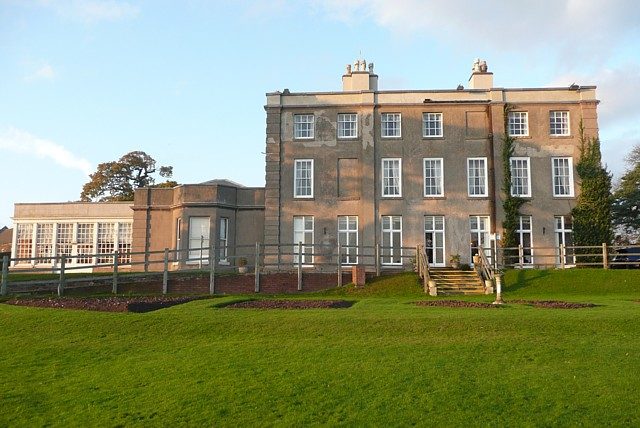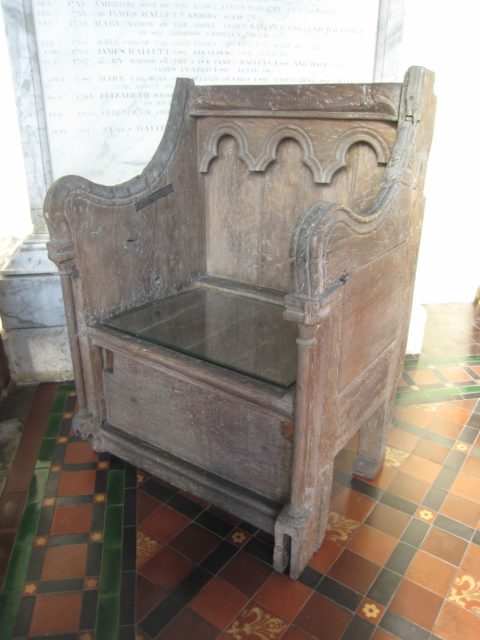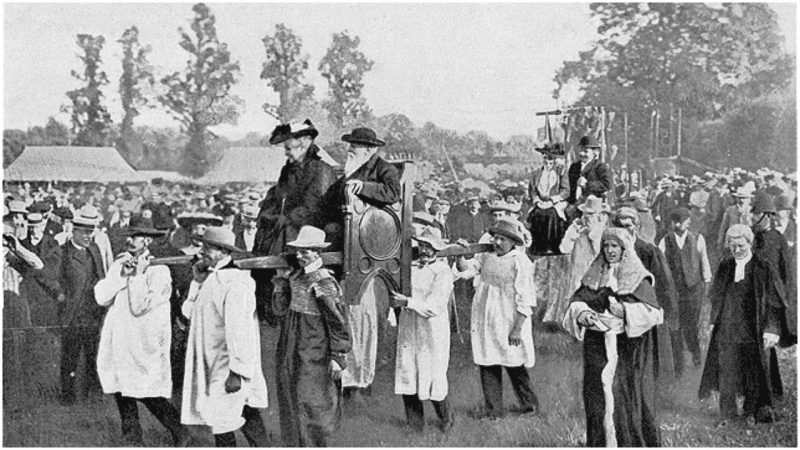It seems like getting married and not regretting it even slightly for the rest of your life has always been a challenge for young couples. This is why a custom was invented in Medieval England that gives credit to couples that managed to remain in the marriage without any regrets for a year and a day.
Besides the public celebration of their love, the couples were also rewarded with a big piece of bacon. Historical records connected with the ritual shows us that the reward was given on very rare occasions, probably because couples which fulfill the conditions of this “challenge” are rare.
Most of the information that we have about this custom come from two places: Whichnoure (Wychnor Hall), Staffordshire and Little Dunmow in Essex, where the tradition survived for several centuries.

In Staffordshire, this custom is connected with the manor of Whichnoure near Lichfield which the Earl of Lancaster gave to Sir Philip de Somerville in 1366, during the ruling of Edward III.
The manor was granted for a small fee and under one condition: the Earl of Lancaster demanded that the new owner should always keep a big piece of bacon hanged in his hall at the manor, in case a couple that swore they wouldn’t regret their marriage for a year and a day demanded it.
To ensure the validity of their claim, the couple was required to bring two neighbors as witnesses and swore an oath. This is the oath that the couple needed to swear:
“Hear ye, Sir Philip de Somervile, lord of Whichenoure, maintainer and giver of this Bacon, that I, (husband), syth I wedded (wife), my wyfe, and syth I had her in my kepyng and at wylle, by a Yere and a Day after our Marryage, I would not have changed for none other, farer ne fowler, richer ne powrer, ne for none other descended of gretter lynage, sleeping ne waking, at noo time; and if the said (wife) were sole, and I sole, I would take her to be my wyfe before all the wymen of the worlde, of what condytions soevere they be, good or evyle, as helpe me God, and his Seyntys, and this flesh, and all fleshes.”
If a couple managed to prove their faithfulness and dedication to each other, they were given the prize and escorted from the hall with a great ceremony accompanied by musicians. Back in those days, the flitch of bacon was a valuable prize, but still, it hasn’t been claimed a lot.
When Horace Walpole visited the Whichnoure manor in 1760, he noted that the bacon prize had not been claimed for over 30 years. There was no fresh bacon in the hall. Instead, they kept a wooden carving of bacon flitch as a symbolical way to respect the conditions upon which the manor was granted.

The Flitch of Bacon custom at Little Dunmow Priory in Essex is more famous and better-documented. According to the records, the custom was started in the 13th century by the family of Robert Fitzwalter who was the Baron of Little Dunmow.
As in the Whichnoure manor version of the custom, the couple needed to swear an oath that “neither of them in a year and a day, neither sleeping or waking, repented of their marriage.” Both of them needed to kneel on some sharp stones in the churchyard while swearing the oath.
The following verse was also chanted during the ceremony:
“You shall swear by custom of confession,
That you ne’er made nuptial transgression;
Nor, since you were married man and wife,
By household brawls, or contentious strife,
Or otherwise at bed or board,
Offended each other in deed or in word,
Or since the parish clerk said, Amen,
Wished yourselves unmarried again,
Or in twelvemonth and a day,
Repented in thought any way,
But continue true in thought and desire,
As when you joined hands in holy quire.
If to these conditions without all fear,
Of your own accord you will freely swear,
A whole gammon of bacon you shall receive,
And bear it hence with love and good leave:
For this is our custom at Dunmow well known,
Tho’ the pleasure be ours, the bacon’s your own.”
After this, the winning couple and their prize bacon were paraded around town accompanied by musicians. Historical records from the Little Dunmow Priory shows that the flitch was awarded only six times, although there are more unrecorded cases. The original Flitch of Bacon tradition became popular in Dunmow, and the custom survived until the 18th century. The last bacon prize here was given on 20 June 1751.
Years later, on 12 June 1772, an attempt for the prize was made by John and Susan Gilder, but when the couple accompanied by a huge crowd came to the priory, the Lord of the Manor didn’t allow them to perform the ceremony there and nailed the doors shut. It looks like the original tradition ended in 1809. Another attempt at winning the prize was made in 1832 by Josiah Vine and his wife who traveled from Reading. They were also refused by the steward of the manor. In 1851, another couple from Felstead tried, and the priory refused their trial too. Luckily, the people of nearby Great Dunmow felt sympathetic and gave the couple a flitch of bacon by themselves.
After hearing about the custom, William Harrison Ainsworth, the famous British historical novelist, published a novel in 1854 called “The Flitch of Bacon.” the novel was so popular in Victorian Britain, that it managed to revive the custom again. Ainsworth helped with the revival of the custom himself by paying for the first two flitches for the ceremonies in 1855. Since then, the revived Flitch of Bacon challenge is still held every fourth year on leap years. The next Flitch of Bacon ceremony will happen in 2020.
The modern event is organized by the Dunmow Flitch Trials Committee. During the ceremony, the Committee hires a counsel which cross-examines the candidates and tries to disprove their claim and save the bacon for the sponsors. The final word is given by a jury.

When the Dunmow Flitch Trials Committee revived the custom, the original sharp stones in the churchyard where couples gave the oath were removed, and the ceremonial chair on which they were paraded was in the permanent ownership of the Little Dunmow Priory. To make the custom as close as possible to the original, replicas of these object were made.
Because Little Dunmow refused to continue with the ceremony, the current trials are held Great Dunmow. The people from Great Dunmow claim that their town is the only place where the flitch of bacon custom is still kept.
